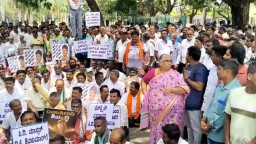Latest News
Prabhu Shakti, Mantrana Shakti and Utsah Shakti
.jpg)
A THE NATURE OF POWER n important, and perhaps the only rule about power is that it abhors a vacuum. Thus, if you are mandated by Raj Dharma to exercise power, you must exercise it with full vigour. Any abdication of the same is not just criminal, but also sinful. I urge you to exercise your Mantra shakti and Utsah Shakti – because if you don’t, someone else will. If you’re not in a position to render advise to the political leadership, someone else will step in, and in this day and age of IT – there is no monopoly over knowledge, and the past precedent is not the only source.
HOW DOES ONE LOOK AT POWER? Do we see it as static – or do we take a more dynamic view of its multiple manifestations. It is true that as industrial areas, education complexes, tourism destinations and production clusters, and agribusinesses value chains take root in the district, there would be many more power centres – but this also makes the task of managing districts more meaningful and interesting for the DM. What it also means is that the focus will shift from livelihoods for survival to skillsets for upward mobility. Internal migration within the country has been going on for over a decade- but after Covid, districts have started tracking where the residents are – to ensure that they get their entitlements – from a PDS card to health facilities. Do we view IT as a tool of empowerment, or do we see it as cutting down our discretion?
FROM RULES TO ROLES As the Prime Minister said in his keynote address on the Mission Karamyogi – we have to move from a Rulebased approach to one in which the Role becomes the driving factor. Thus, if you take a dynamic view of power – you will find that the Amrit Kaal of India’s century offers a billion opportunities to do good, and to excel. If you are governance professionals – which I believe you are – then you must view your role in that light. Study the ground reality. observe the rules that are not in sync with the zeitgeist (spirt of the time) and change them (where you can) and ask for them to be changed when the authority lies elsewhere. And one can be at the bottom of the administrative pyramid to initiate change.
Now that I am a senior citizen, I am entitled to tell some stories and blow my trumpet. In the fifth year of my service, I was the CEO of the Himalayan Milk Union where our profitability was affected because as per the extant norms of PFA, toned milk had to have a minimum of 3% fat. The norms for milk had been made for the city of Bombay- and the main source of procurement was buffalo milk – which naturally had a higher fat content. These norms were applied, without adequate thought – across the country, including the municipalities in Darjeeling. Now you can visualise the difference between the desi cows of the hills with the sturdy buffaloes of Maharashtra and Gujarat. The intent was to prevent adulteration –but for Himul, it meant that we had to add WMP to increase the fat content of the naturally ‘lean milk’ of the cows.
Let me also take this opportunity to address the elephant in the room: I know that many readers have been concerned about comments of Mr D Subba Rao, an exgovernor of RBI about relevance of IAS. He blames disregard of merit and the ‘automatic promotion’ policy as main reason for so-called decline in the fabric of civil services. Are we going to accept the proposition of Mr D Subba Rao and others of his ilk who believe in writing the epitaph of the IAS (and by implication – the other constituted services). To this my response is an emphatic NO. For if we accept that India has done well in most parameters of governance the credit should be shared equally by the political executive and ourselves. We handled the Covid crisis admirably – in all the states and UTs – even when they were under different political dispensations.
As such, while it is important to acknowledge our failures, it is equally, if not more important to acknowledge our successes and celebrate them.
THE VIEWS EXPRESSED BY THE AUTHOR ARE PERSONAL
The writer is Distinguished Fellow, USI Delhi and Historian & Policy Analyst. Also former Director, Lal Bahadur Shastri National Academy of Administration, Mussoorie

.png)











.jpg)

.jpg)
.jpg)
.jpg)
.jpg)

.jpg)
